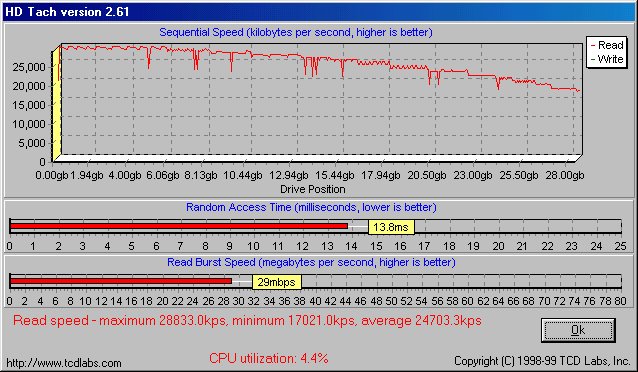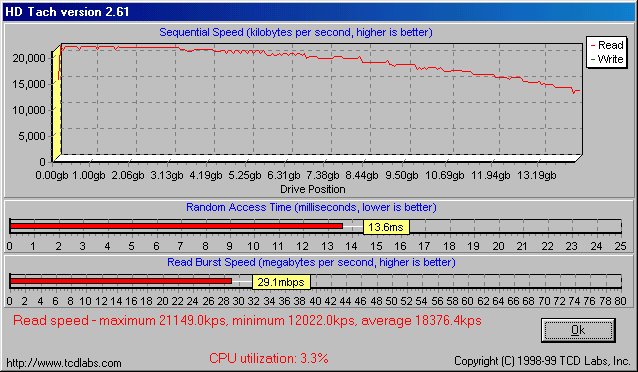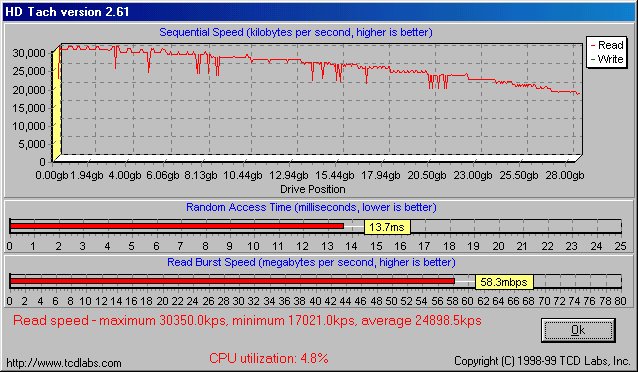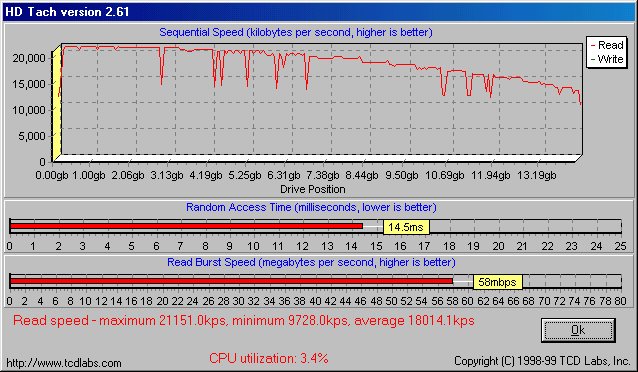ATA33 Cable Tests
30.7GB
Sustained Transfer Rate (ATA33 Cable)

15.3GB Sustained Transfer Rate (ATA33 Cable)

Windows 98SE Transfer
Rates (ATA33 Cable)
15.3GB-->
632MB/180sec=3.51MB/s
30.7GB--> 632MB/120sec=5.27MB/s
ATA66 Cable Tests
30.7GB
Sustained Transfer Rate (ATA66 Cable)

15.3GB
Sustained Transfer Rate (ATA66 Cable)

Windows 98SE Transfer
Rates (ATA66 Cable)
15.3GB-->
632MB/170sec=3.72MB/s
30.7GB--> 632MB/113sec=5.59MB/s
Results
I would assume
that because the 15.3GB drive has a platter size that is exactly half of the
30.7GB drive, it would be half as fast. On the other hand, I would also assume
that because the larger drive has twice the density of the smaller drive that
it should be twice as fast. Neither assumption turn out to be true; however,
all hope is not lost as both drives are fast. The 30.7GB is very
fast.
While fiddling
with transfer rates, I decided to touch on overclockability. Previous Maxtor
drives were overclockable (pushing the PCI bus to speeds above 33.3MHz); however,
a reduction of the UDMA or PIO modes was necessary to ensure stability. Both
drives were run with 100% stability at PCI bus speeds from 29MHz to 38MHz.
The Maxtor 30.7GB drive
is the fastest IDE I've tested to date, with an STR exceeding 30MB/s in the
first 10% of the total available space. This will be efficiently utilized
when selecting a fixed swapfile and placing it at the front of the first platter.
The Win98SE
tests proved very revealing. While hooked to the more limiting ATA33 cable,
the big Maxtor was still fully 50% faster than it's older sibling. Hooking
both to an ATA66 cable gave similar results as the 10.2GB per platter drive
maintained a 50% speed lead.
The speed
increase upgrading from an ATA33 cable to the quicker ATA66 cable is almost
negligible. The maximum STR of the larger drive was clipped slightly but the
smaller drive showed zero signs of improvement. The more complex Win98SE read/write
tests exposed the real-world differences. The 15.3GB drive was 5.98% quicker
and the 30.7GB drive gained a paltry 6.07%. If you require a fast drive and
are concerned about losing performance to the older IDE standard, not to worry--IDE
drives aren't fast enough to use anywhere near the ATA66 maximum.
Conclusion
Selling on
the web for under $200, the Maxtor DiamondMax 30.7GB 7200 RPM hard drive is
a great choice for all your high performance storage needs. Sporting sustained
transfer rates exceeding 30MB/s and an overall average of nearly 25MB/s, this
3 platter solution runs warm to the touch and is also quiet. Overclockers
can use this drive with all sorts of oddball bus speeds with either IDE standard.
Combine the aforementioned traits with Maxtor's excellent reliability record
and customer service and you wind up with a product that is easily a best
in class recommendation.
William
Yaple
03/24/00
